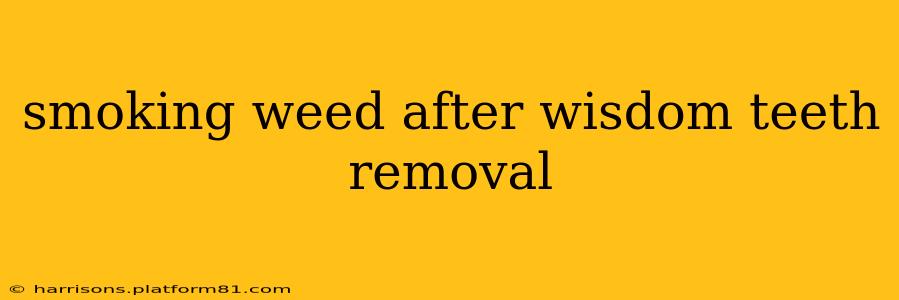Getting your wisdom teeth out is a significant oral surgery. The recovery process requires careful attention to ensure proper healing and minimize complications. Many people wonder about the impact of smoking weed after wisdom teeth removal, and the answer is generally: it's strongly discouraged. While the desire to alleviate post-operative pain and discomfort is understandable, the risks associated with smoking cannabis after this procedure significantly outweigh any potential benefits.
Why Shouldn't You Smoke Weed After Wisdom Teeth Removal?
The primary reason to avoid smoking weed after wisdom teeth removal is the increased risk of dry socket. Dry socket (alveolar osteitis) is a painful complication that occurs when the blood clot protecting the extraction site dislodges or dissolves prematurely. This exposes the underlying bone and nerve endings, leading to intense pain, bad breath, and even infection.
Smoking, whether it's weed or tobacco, creates negative pressure in the mouth that can dislodge this crucial blood clot. The act of inhaling and exhaling forcefully pulls air across the extraction sites, interfering with the healing process and dramatically increasing the risk of dry socket.
What are the other risks associated with smoking weed after wisdom teeth removal?
Beyond dry socket, smoking weed after wisdom teeth removal presents several other potential problems:
- Increased bleeding: The active ingredients in cannabis can thin the blood, potentially leading to increased bleeding from the extraction sites. This can prolong healing time and create complications.
- Infection: Smoking introduces bacteria and irritants into the mouth, increasing the risk of infection at the surgical sites. A compromised immune system post-surgery makes you more vulnerable to infection.
- Delayed healing: The act of smoking and the irritants it introduces can impede the healing process, potentially leading to prolonged discomfort and complications.
- Interaction with medication: Some pain relievers prescribed after wisdom teeth removal might interact negatively with cannabis, leading to unforeseen side effects. Always consult your dentist or doctor before combining medications.
How long should I wait to smoke weed after wisdom teeth removal?
This is a question best answered by your dentist or oral surgeon. The healing process varies from person to person, and they can assess your specific situation and provide personalized advice. Generally, it's recommended to avoid smoking anything, including weed, for at least a week, and potentially longer depending on the complexity of the surgery and your individual healing progress.
What are the alternatives to smoking weed for pain relief after wisdom teeth removal?
Numerous safe and effective pain management strategies exist to help you manage discomfort after wisdom teeth removal. These include:
- Prescription pain medication: Your dentist or oral surgeon will likely prescribe pain relievers tailored to your needs. Follow their instructions carefully.
- Over-the-counter pain relievers: Ibuprofen or acetaminophen can effectively manage mild to moderate pain. Always follow the recommended dosage.
- Ice packs: Applying ice packs to your cheeks can reduce swelling and numb the area, providing temporary pain relief.
- Saltwater rinses: Rinsing your mouth with warm salt water can help keep the extraction sites clean and promote healing.
- Rest: Getting plenty of rest allows your body to focus on healing.
What if I already smoked weed after wisdom teeth removal?
If you've already smoked weed after your wisdom teeth removal and are experiencing any complications, contact your dentist or oral surgeon immediately. Early intervention is crucial in preventing more serious issues.
In conclusion, while the temptation to use cannabis for pain relief after wisdom teeth removal might be strong, the potential risks significantly outweigh any benefits. Prioritize your oral health and follow your dentist's instructions for optimal recovery. Safe and effective alternatives are readily available to manage post-operative discomfort. Remember, consulting with your healthcare provider is crucial for personalized advice and guidance.
